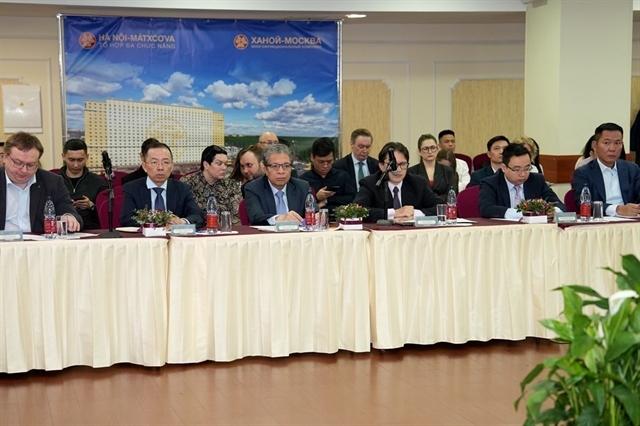 Society
Society


|
| Việt Nam's Ambassador to Russia Đặng Minh Khôi (third from left) at the seminar. — VNA/VNS Photo Lê Quang Vinh |
MOSCOW — The Vietnamese Embassy in Russia organised a seminar on April 19 on prospects for Việt Nam-Russia digital economic cooperation, attracting over 100 delegates representing ministries, sectors, research institutes, and business associations of the two countries.
The function focused on opportunities and solutions to further promote cooperation between the two nations in this promising field.
In recent years, Việt Nam's digital economy has experienced remarkable development. According to the Ministry of Information and Communications, the proportion of the digital economy in Việt Nam's GDP reached 16.5 per cent in 2023, with an average annual growth rate of 20 per cent, which is three times the GDP growth rate.
According to assessments from international organisations, the scale of Việt Nam's Internet economy in 2023 reached approximately US$30 billion, up 19 per cent compared to the figure in 2022.
Vietnamese digital technology companies have also been gradually strengthening their international cooperation efforts. Last year, the country had over 1,500 digital technology enterprises with revenue from foreign markets totaling an estimated $7.5 billion, up 4 per cent year-on-year.
Meanwhile, the strongest growth in Russia's Internet economy is observed in the e-commerce sector, with total revenue reaching RUB$15.4 trillion (over $164 billion) in 2023. Russia also leads in the field of smart cities and e-government, with cities like Moscow and St. Petersburg being at the forefront of IT applications worldwide.
Delegates said that the current context presents tremendous opportunities for cooperation between the two countries in general and between their respective businesses in particular. Several digital economic cooperation projects are already underway between Việt Nam and Russia, particularly in such areas as cybersecurity, smart cities, digital banking, and digital business solutions.
In addition to the aforementioned projects, participants also highlighted numerous other promising areas for digital economic cooperation, such as finance, health care, agriculture, transportation, energy, environment, and manufacturing.
They put forward recommendations and solutions to further expand cooperation in the digital economy sector from the perspectives of policymakers, researchers, and businesses, including intensifying the trade promotion in information technology products of the two countries, and boosting collaboration in researching and developing digital platforms and products.
Ambassador Đặng Minh Khôi emphasised the significance of the event, saying Russia's experiences in developing its digital ruble is highly beneficial, expressing Việt Nam's interest in participating in the testing process of Russia's digital ruble by the Central Bank of Russia.
Delegates agreed that if utilised effectively, this could be a significant driver for economic cooperation between the two countries in the coming time. — VNS




